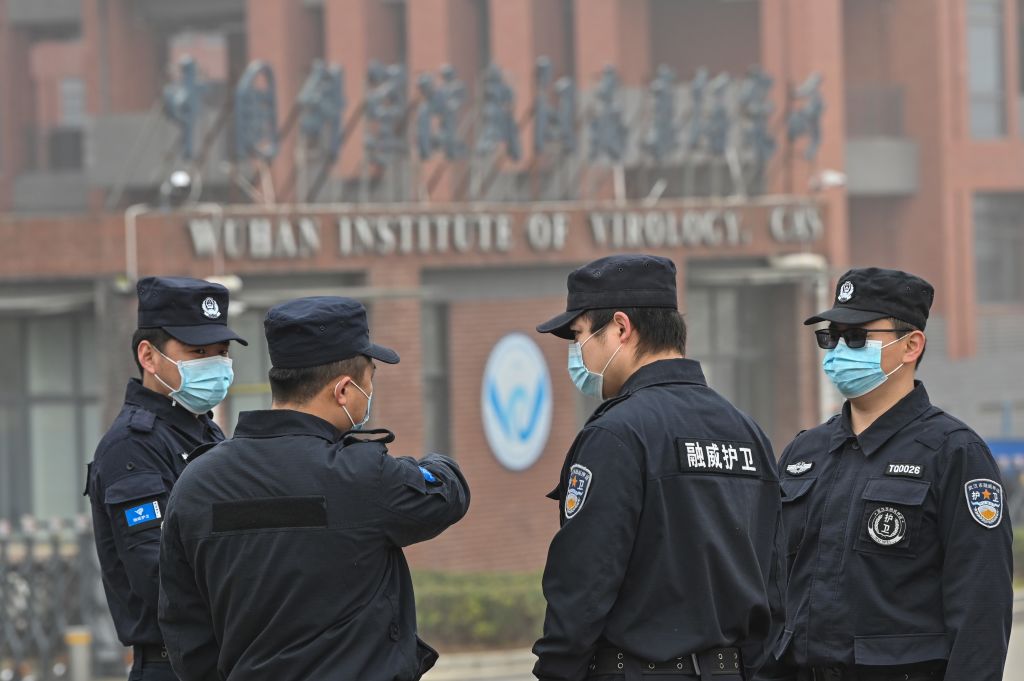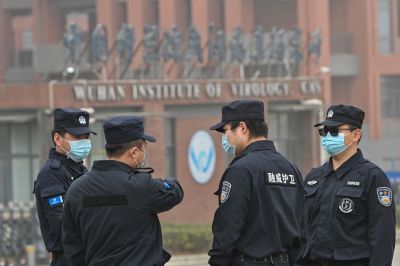Happy Thursday! “Kyle from Chicago,” visiting Nashville for the NHL Draft last night, was stopped on the street this week by the crew from The Penalty Box podcast for a man-on-the-street interview about hockey and the Chicago Blackhawks’ pick of once-in-a-generation talent, Connor Bedard, as the number one overall selection. “On a scale of one to ten, how much would you say you know about hockey?” He responded: “I didn’t play professionally or anything, so probably like a four?” He was being…modest. Unbeknownst to the interviewer, “Kyle from Chicago” was Blackhawks General Manager, Kyle Davidson. Well played.
Quick Hits: Today’s Top Stories
- Gary Shapley—an IRS whistleblower who testified before the House Ways and Means Committee—told Fox News’ Bret Baier Wednesday that the Department of Justice blocked the IRS from executing a search warrant as part of its investigation into Hunter Biden. In a redacted transcript released last week, Shapley told the committee the DOJ also prevented the U.S. attorney overseeing the investigation from bringing felony charges against Biden on at least two occasions. Also Wednesday, President Joe Biden denied he was involved or present in 2017 when his son Hunter Biden allegedly texted a Chinese businessman claiming he was with his father as leverage to push for payments.
- Wildfire smoke drifting down from Canada caused air quality alerts for dangerous pollutants in 20 states across the United States on Wednesday, reaching as far south as Atlanta and Birmingham. The National Weather Service predicts air quality will improve today.
- The Biden administration is reportedly considering new export controls that would restrict China’s ability to obtain certain artificial intelligence technologies. Shares of U.S.-based chip producer Nvidia—which created a new, weaker chip for Chinese buyers to evade previous U.S. export restrictions—fell 1.8 percent Wednesday.
- Polish Deputy Prime Minister Jarosław Kaczyński announced Wednesday the country will boost security at its border with Belarus to prepare for the arrival of Wagner Group fighters exiled to the country after the Russian paramilitary group’s aborted rebellion against the Kremlin. Polish officials estimate 8,000 Wagner fighters will come to Belarus—which is already at odds with Poland over migrant flows—and Kaczyński said Poland will increase its troop presence and build unspecified defenses along the border.
- Daniel Penny—the U.S. Marine veteran who choked and killed New Yorker Jordan Neely on a subway in May after the mentally ill man began acting aggressively toward commuters—pleaded not guilty to second-degree manslaughter and criminally negligent homicide charges on Wednesday. Penny was indicted by a New York grand jury last month.
- Israeli officials have reportedly detained four Jewish Israeli settlers accused of burning Palestinians’ cars and looting homes in the West Bank during settler riots, which began after a Palestinian terror attack Tuesday killed four Israelis near Eli, an Israeli West Bank settlement. Prime Minister Benjamin Netanyahu on Wednesday denounced the riots, but authorized 1,000 new settler homes in Eli as a “response to terror.”
- Former U.S. Senator and Connecticut Gov. Lowell Weicker died Wednesday at the age of 92. A Republican willing to buck his party throughout his three terms in the Senate, Weicker’s political career was kickstarted by his prominent role in the body’s Watergate investigation.
Intel Community Releases Little COVID Intel

Our TMD writers are no strangers to missing deadlines, but even we were struck by Director of National Intelligence Avril Haines’ tardiness. The Office of the Director of National Intelligence (ODNI) was statutorily required to release a report on June 18, but the agency published it more than a week late—and it came in at a measly 1o pages long.
Depending on where you’re standing, the long-awaited declassified ODNI report on the pandemic’s origins demonstrates either a lack of proof for the COVID lab leak theory or the theory’s continued viability. With more questions than answers, some lawmakers continue to scrutinize funding for coronavirus research conducted at labs like the Wuhan Institute of Virology (WIV).
Prigozhin’s Rebellion: The Continuing Saga
Earlier this week, one intrepid reporter on the Defense Department beat voiced what the whole world was thinking when he asked Pentagon Press Secretary Patrick Ryder, “Are we in a Weekend At Bernie’s scenario right now?”
Such is Yevgeny Prigozhin’s lot since last week’s aborted mutiny in Russia—having to show his face publicly (walking of his own volition) at regular intervals just to prove he’s still alive. The Russian oligarch and his Wagner Group—a mercenary army known for doing the Kremlin’s dirty work around the world, including on the battlefield in Ukraine—now face an uncertain future after long-simmering tensions with the Russian military erupted into a short-lived rebellion last weekend.
More details have emerged about the attempted putsch since we last wrote to you, but the story is being told primarily by three notoriously unreliable narrators: Russian President Vladimir Putin, Prigozhin, and Belarusian President Alexander Lukashenko. The Kremlin, for its part, seems to be trying to do two contradictory things at once: condemn treason that it says almost led to a civil war, and project its own stability and control of the situation. To do that, it’s eschewing—for now—most criminal punishment for the perpetrators.
According to Belarusian President Alexander Lukashenko, offing Prigozhin was on the table when he spoke to Russian President Vladimir Putin Saturday morning as Prigozhin’s mutiny was ongoing. “I thought: it was possible to kill him,” Lukashenko claimed Tuesday. “I told Putin: ‘He can be eliminated. That is not a problem. If not at the first try, but at the second one for sure.’ I said then: ‘Do not do it.’” Apparently, in the name of peace—and for fear of his loyal mercenaries’ reaction—the duo decided to spare the Wagner Group leader.
Though reports from Russian media earlier this week indicated otherwise, the FSB—Russia’s security service—said Tuesday it had closed the investigation into Prigozhin it had swiftly opened Friday night as he threatened rebellion, ultimately bringing no criminal charges against the mercenary leader or any of his men. Lukashenko claimed Tuesday Prigozhin had landed in Belarus to begin his exile, one of the requirements of the deal the Belarusian leader brokered between Putin and Prigozhin.
That same day, during a ceremony at the Kremlin honoring members of the Russian National Guard and security forces, Putin thanked soldiers for their service to the “Motherland” over the weekend. “You have stopped a civil war,” he said, echoing a sentiment he had expressed on Saturday as the mutiny was underway.
The apocalyptic rhetoric, however, seems at odds with the punishment Putin has thus far meted out for the mutineers. That disconnect may be intentional. “Putin is doing everything in his power to make sure that Prigozhin does not become a martyr for the need to change military commands in an effort to win the war” Kateryna Stepanenko, a Russia analyst at the Institute for the Study of War, tells TMD. The Russian leader, she added, is also trying to avoid alienating former Wagner fighters he hopes will go on to sign defense ministry contracts.
Putin claimed Tuesday the Russian state paid Wagner the equivalent of almost $1 billion over the last year. “I hope that while doing so they didn’t steal anything, or stole not so much,” he said of Wagner without naming Prigozhin directly. The remarks represent the first time the Russian president has acknowledged public funding for the paramilitary organization, and, according to Stepanenko, the disclosure was perhaps motivated by an effort to make Prigozhin look ideologically bankrupt—and downright corrupt—after pushing back on the defense ministry.
Prigozhin, for his part, tried on Monday to downplay the rebellion. “The goal of our campaign was to prevent the destruction of Wagner Group and hold accountable the individuals who, through their unprofessional actions, made a significant number of mistakes during the Special Operation,” he said, speaking for the first time since Saturday’s mutiny in an 11-minute audio message posted to the social media site Telegram. He suggested his decision to march to Moscow was made spontaneously—shortly after a still-unconfirmed air strike against a Wagner encampment in Ukraine which he claims killed at least 30 of his mercenaries—and maintained he never had any intention of ousting Putin. “We marched to demonstrate our opposition,” he said, “not to overthrow the government.”
That may be true, but new reporting on U.S. intelligence assessments complicates the story. As we wrote earlier this week, American three-letter agencies were reportedly aware Prigozhin was planning some sort of retaliation against Russian military leaders after they issued a June 10 decree forcing all of Russia’s private military companies to sign contracts with the defense ministry—functionally absorbing them into the ministry—by July 1. New reporting from the Wall Street Journal goes even further, suggesting Prigozhin had planned to capture Defense Minister Sergei Shoigu and Chief of the General Staff Valery Gerasimov—with whom he has a long-running and well-publicized feud—during a planned visit by the duo to Wagner’s position in southern Ukraine.
The FSB reportedly got a whiff of what Prigozhin was planning, but did little to prevent him and his forces from taking Rostov-on-Don, the southern military district headquarters. Western officials, according to the Journal’s reporting, believed Prigozhin’s original plan had a “good chance” of success but that the Wagner leader was forced to “improvise” after his scheme was leaked.
Details are still murky, but he may have had a man on the inside. According to the New York Times, a Wagner-friendly Russian general, Sergey Serovikin, might have known about Prigozhin’s rebellion in advance. Western officials are investigating whether he was also involved in the planning, and whether Prigozhin might have been expecting more support from the military establishment. As the Wagner leader was making noise about a rebellion Friday night, Serovikin—the second in command of Russia’s invasion demoted from the top job in January—released a video urging the mutineers to return to their camps. He’s yet to be seen publicly since releasing the video, and, according to some reports, is currently in Russian custody.
As the July 1 deadline approaches for Wagner mercenaries to sign defense ministry contracts, the next big question will be, “What happens to Wagner now?” On that, too, Moscow is sending mixed messages. The defense ministry suggested Tuesday it had begun accepting heavy weaponry from Wagner men as part of the group’s demilitarization, but Russian Foreign Minister Sergei Lavrov seemed to indicate Wagner would continue its activities in Africa, where the group provides contracted security services to regimes in Mali, the Central African Republic, and elsewhere. They’re tasked with fighting terrorists and armed rebel groups, and are known for their “shoot first, ask questions later” ethos that has allegedly resulted in the massacre of civilians. Lavrov said Monday Wagner—whose mercenaries he claimed were working as “instructors”—was doing “a good job” in Africa.
They were doing “a good job” in Ukraine, too, notching most of the few victories Moscow can claim in its invasion—a fact that, according to Stepanenko, makes reorganizing Wagner and trying to win over the former mercenaries such a high-stakes game for Putin: “He needs these forces to continue fighting in Ukraine.”
Worth Your Time
- Fifty years ago, a fire on the sixth floor of a nearly five-acre government records building in St. Louis destroyed 17,517,490 military personnel records and damaged some 6.5 million more, obliterating a swathe of history. For Wired, Megan Greenwell recounts the fire, archivists’ efforts to rescue and preserve the documents, and her hunt for her grandfather’s World War II service records. “When I visit the National Personnel Records Center in early March, Ashley Cox, who leads a team of preservation specialists, is opening a folder for a World War II lieutenant named William F. Weisnet,” Greenwell writes. “Cox [thinks] of each record she works with as if it were a person under her care. ‘This particular person got very damaged, and you can go through all the physical therapy ever, but that injury is still going to hurt,’ she says, gesturing at Weisnet’s inch-thick file. ‘So the less that you can aggravate that old injury, the safer it is.’”
Presented Without Comment
Insider: Biden Has Confused Iraq for Ukraine Twice in the Last 24 Hours
Also Presented Without Comment
ABC News: Trump Weighs in on Recording of Him Showing Off ‘Secret’ Government Info: ‘It’s Bravado’
Also Also Presented Without Comment
Semafor: New Zealand Moves to Eradicate Every Single Rat
Toeing the Company Line
- In the newsletters: The Dispatch Politics team reports on Nikki Haley’s attacks on Trump and Scott Walker’s potential Senate bid in Wisconsin, Nick wonders if (🔒) the GOP presidential primary isn’t over before it even gets started, and Jonah defends conservatism from the “opportunists and pyromaniacs” on the right who are “rejecting the ideals we once took as givens.”
- On the podcasts: Jonah returns for a listener question-fueled Remnant, tackling everything from the latest Supreme Court controversy to the conservative underpinnings of popular movies and television shows.
- On the site: Jacob breaks down an upcoming SCOTUS case on religious liberties, Peter explains the Federal Trade Commission’s lawsuit against Amazon, and Rebeccah Heinrichs covers the fallout from the Wagner group’s rebellion in Russia.
Let Us Know
Do you agree with Sen. Ernst that the United States should not be using taxpayer dollars to “underwrit[e] risky research or subsidiz[e] communist China’s state-run institutions?” If Chinese scientists are going to continue such risky research regardless, would you prefer that their American counterparts at least have visibility into what they’re doing?









Please note that we at The Dispatch hold ourselves, our work, and our commenters to a higher standard than other places on the internet. We welcome comments that foster genuine debate or discussion—including comments critical of us or our work—but responses that include ad hominem attacks on fellow Dispatch members or are intended to stoke fear and anger may be moderated.
With your membership, you only have the ability to comment on The Morning Dispatch articles. Consider upgrading to join the conversation everywhere.